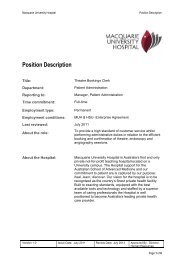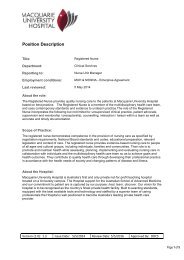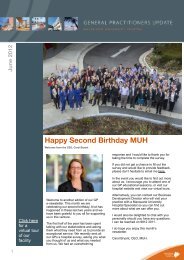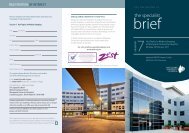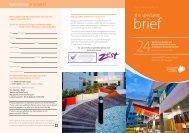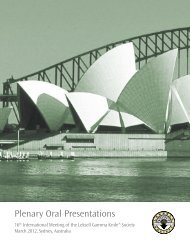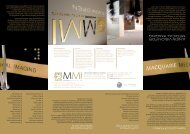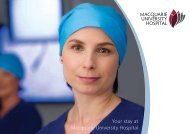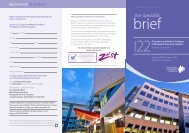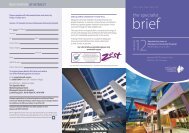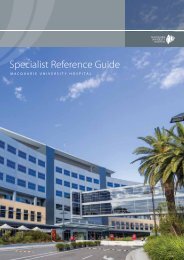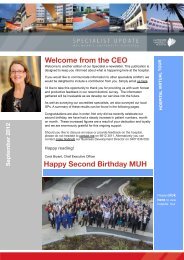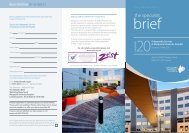reconstructive plastic surgery - Macquarie University Hospital
reconstructive plastic surgery - Macquarie University Hospital
reconstructive plastic surgery - Macquarie University Hospital
Create successful ePaper yourself
Turn your PDF publications into a flip-book with our unique Google optimized e-Paper software.
A COMPREHEnSiVE<br />
liTERATuRE REViEw finDS<br />
THAT PHYSiCiAnS knOw<br />
SuRPRiSinGlY liTTlE AbOuT<br />
THEiR CARDiAC PATiEnTS’<br />
DiETARY SuPPlEMEnT uSE<br />
– A SiTuATiOn THAT COulD<br />
COMPROMiSE THE EffECTiVE<br />
TREATMEnT Of SERiOuS<br />
HEART COnDiTiOnS.<br />
over 500 articles were retrieved and<br />
20 studies met the criteria for the review.<br />
Their meta-analysis revealed that while the<br />
use of dietary supplements is common –<br />
with up to 64 per cent of cardiac patients<br />
taking supplements – most treating<br />
physicians (40 to 95 per cent) are not aware<br />
of their patients’ supplement use.<br />
The research found that when patients were<br />
asked why they did not disclose<br />
supplement use to their doctors, they<br />
placed the responsibility with their doctors,<br />
saying that they thought their doctors<br />
would ask if the issue was of significance.<br />
“This has profound implications,” said<br />
Professor Kiat. “For more than half of all<br />
doctors never to ask about medications<br />
other than prescription medications is<br />
potentially troubling.”<br />
Professor Kiat’s concern lies in the fact that<br />
supplements could potentially interfere<br />
with the effectiveness of prescription<br />
medications or produce clinically important<br />
drug interactions.<br />
“A typical example is blood thinners, which<br />
are widely used in cardiology,” said Professor<br />
Kiat. “Warfarin, aspirin and clopidogrel, for<br />
example, are potent drugs in themselves.<br />
“Many patients, however, take additional<br />
supplements that have blood thinning<br />
properties – such as ginkgo, fish oil, vitamin<br />
e, ginger, garlic and glucosamine.<br />
Alternatively, some patients take vitamin K<br />
or St John’s wort, which could reduce the<br />
blood thinning effect of warfarin. either way,<br />
these supplements and possibly others may<br />
result in deleterious effects for a patient.<br />
“We have not yet had robust clinical studies<br />
evaluating the impact of supplements on<br />
prescription medications, so this situation is<br />
further complicated.<br />
“even if patients did disclose their<br />
supplement use – and many patients might<br />
be taking three to five different types of<br />
supplements – then it is still difficult for a<br />
doctor to control or adjust the prescription<br />
medication accordingly.”<br />
Because of the potential for negative effects,<br />
Professor Kiat says change is needed.<br />
“It is very important that doctors ask<br />
specifically what complementary medicines<br />
their patients are taking, in addition to their<br />
questions about prescription medication,”<br />
explained Professor Kiat.<br />
“The key is that doctors must actually ask<br />
this question in order to give patients a<br />
window of opportunity to disclose<br />
pertinent information.”<br />
But this alone is not enough. In addition to<br />
more research on the interaction between<br />
alternative and prescription medicines,<br />
pharmacology training around this is<br />
important.<br />
“even if the research exists, if a doctor<br />
doesn’t know what fish oil does, then that is<br />
an impediment to his or her practice,”<br />
explained Professor Kiat. “education in at<br />
least the most commonly used supplements,<br />
the top ten – such as ginkgo, ginseng, folic<br />
acid, vitamin e, evening primrose oil and fish<br />
oil – would make a difference.”<br />
Ideally, this education would form part of<br />
pharmacology training in medical schools,<br />
but it could also be available as continuing<br />
education for doctors already practicing.<br />
There are also cultural differences that doctors<br />
need to be aware of. The Chinese community<br />
might make extensive use of ginseng, but a<br />
patient from the Arab community may<br />
never have heard of this supplement.<br />
Doctors must be able to address different<br />
communities’ habits. education and<br />
awareness training could target doctors<br />
working in specific communities to make<br />
sure they have culturally relevant knowledge.<br />
Professor Kiat says that some advanced and<br />
informal training is already happening. For<br />
example, the complementary medicine and<br />
education group (CompleMeD) at the<br />
<strong>University</strong> of Western Sydney, to which he<br />
belongs, is comprised of scientists and<br />
doctors undertaking robust research into<br />
complementary medicine and promoting<br />
awareness and education to GPs and<br />
specialists.<br />
“Whether we like it or not, our patients are<br />
taking complementary medicines,” noted<br />
Professor Kiat. “We may agree or disagree,<br />
but it’s happening and it’s our duty as<br />
physicians to know what a patient is taking<br />
and how to respond effectively.”<br />
13



